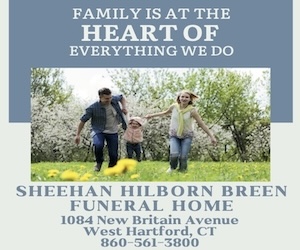“The power of faith is a Jewish concept; hope flows from feelings of faith.”
By Cindy Mindell
WEST HARTFORD – In June, Hartford Hospital named its multi-faith chapel after Rabbi Philip Lazowski and the late Fr. John J. Kiely, who worked together as chaplains at the hospital and at the Institute of Living. The naming was made possible by a donation from Rabbi Lazowski’s son, Alan Lazowski, to the Institute of Living’s Depression Initiative.
Lazowski – a Polish Jew whose harrowing escapes from the Nazis as a boy has been immortalized in his memoir, “Faith and Destiny” – is the author of several other books on Jewish ritual and interfaith relations. Recently, he self-published “Why a Rabbi?” — a book whose proceeds will benefit educational programs at The Emanuel Synagogue in West Hartford, where Lazowski is rabbi emeritus, and the Voices of Hope Holocaust-education project.
Lazowski spoke with the Ledger about his 40-plus-year tenure as a hospital chaplain.
Q: When did your chaplaincy work begin – and what does it mean to be a chaplain?
A: I began working as a chaplain over 40 years ago in the Institute of Living [before it was acquired by Hartford Hospital], a chaplaincy that has to do with people with mental problems – depression, drug or alcohol addiction, etc. At the time, we had three chaplains – a priest, a minister, and a rabbi. The priest, Fr. John Kiely, and I had a very close relationship. When the hospital wanted to name the chapel after me, I told them that I would like very much that Fr. Kiely’s should be on it as well. He was instrumental on my anniversary to get from the pope a proclamation and medal for me for my work.
At the Hartford Hospital Clinical Pastoral Education program, they teach two important concepts in counseling people: faith and hope – or, comfort and optimism. Faith is a kind of confidence in something and hope is a kind of optimism in the future. The power of faith is a Jewish concept; hope flows from feelings of faith, and whether you call it “faith” or “confidence,” it can give you hope and optimism about the future. Faith can be broken down into three components: faith in God, in humanity, and in self. Each of us has a spark of holiness that animates us with life.
What I was trying to do as a chaplain was motivate patients and let them talk out their anxieties and what bothers them, especially those who were in a state of depression. Most of the patients I see are not religious people, and I try to get them to understand certain things like faith in God; that each of us has a soul that is holy and can do many good things. Faith in God means that God is interested and sympathetic and involved in your life. We try to awaken individuals to have a little feeling for God.
Faith in humanity means that the soul is capable of infinite achievement and greatness. However, people learn many bad things from others and TV, which glorifies drugs and violence and a sex-saturated lifestyle that chips away the dignity and morality of humankind and replaces it with a grimmer view of humanity. Especially when I’m working with young people, I try to teach them to also have faith in our legal system. The laws may be at times imperfect and incorrect but there is always an attempt to correct them.
Q: Why did you want to do chaplaincy work?
A: I feel that you can help spiritually a lot of patients with mental-health issues, and I derive a lot of satisfaction, especially when I can help them. Bikkur cholim is a big mitzvah. The Talmud says that when you visit a sick person, you take away one-sixtieth of their sickness. That’s what we’re trying to do, and sometimes patients need to read books about other people’s experiences, like survivors’ stories.
As a Holocaust survivor, I have so much in common with them, so they really open up to me – at times, more than to their psychiatrist.
Q: What does it take to be an effective chaplain?
A: To be a chaplain at Hartford Hospital is different than at Institute of Living, because the person is only sick physically and not spiritually. When a person is physically ill, you try in every possible way to comfort him. The chaplains go around to the rooms and if the patients want a prayer, we give them a prayer and many ask for a copy of the book of Psalms to read. But the people don’t stay too long unless they have a very serious sickness; most stay for two or three days. I ask the patient if they’re comfortable, if the nurses are treating them well, if they’re getting proper food. If nobody’s there to feed them, I feed them. Sometimes they don’t have their family around, so you have to ask them if they have anybody coming to visit and if the answer is no, I know what has to be done. By experience, you get to know that certain people want to see you and others are too sick. With physically ill patients, you usually visit for just a few minutes, but at the Institute for Living, when you deal with mentally ill patients, sometimes you have to spend hours.
Q: You and your wife, Ruth, recently took your family back to Poland to the places where you survived the Holocaust. What were some of the more significant moments during the trip?
A: We went to the town of Zdzieciol [Zhetel], and I showed them the movie theater where my mother pushed me out of the window so that I survived, and showed them the grave of 3,000 Jews who were killed during the first massacre in March 1941. We went to the Bielica Jewish cemetery, where 3,200 people were buried in a mass grave during the second massacre, including my mother, two of my three brothers, and my sister. We visited the Bielica ghetto, where I lived when I was 11, I ran away from the ghetto one week before a massacre of 10,000 Jews, who are buried in a mass grave. I prayed at all the mass graves. Our children and grandchildren were standing there, crying.
We went to the woods where both our families hid. When you suffer and survive, you can relate more to people who suffer.
We were driving along the Krniczanka River near Bielica and it looked familiar and I told my kids and grandkids that I remembered when we were living in the woods, we used to go at night to the village and knock on doors and people would share a little food with us. We turned off the road into the village and found four old ladies sitting on a bench and Ruth started a conversation with them in Russian. We told them our story and the reason we brought our children and grandchildren with us, and I told them that my name was Lazowski. Tears started running down one of the woman’s faces. She said, “We gave you food and my father worked for your father as a fisherman.” We stayed for a while, we sang Russian songs with them. I was overjoyed to thank these women for what they did for us.
The land is saturated with Jewish blood. Only by returning to America could I appreciate what we have here.
Comments? Email cindym@jewishledger.com.








 Southern New England Jewish Ledger
Southern New England Jewish Ledger









